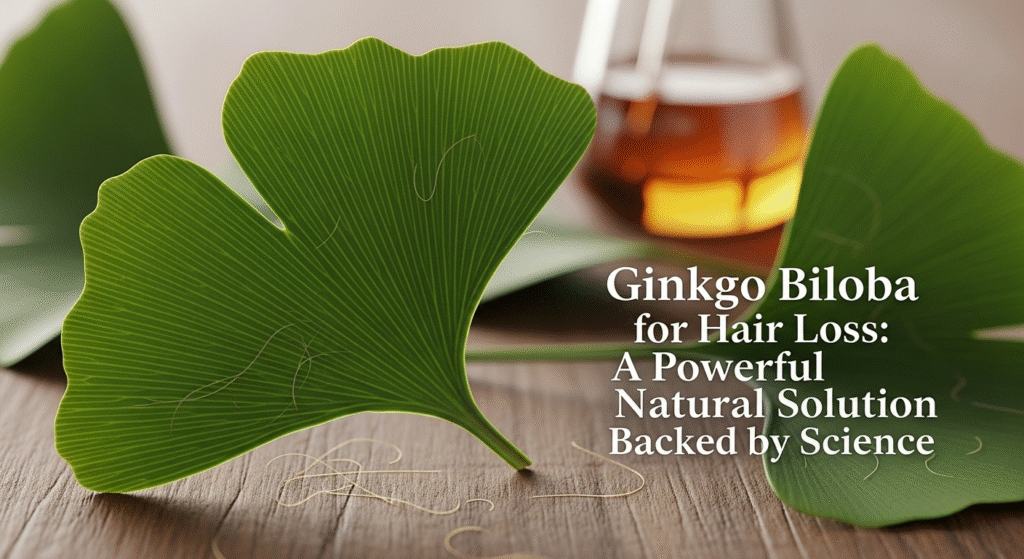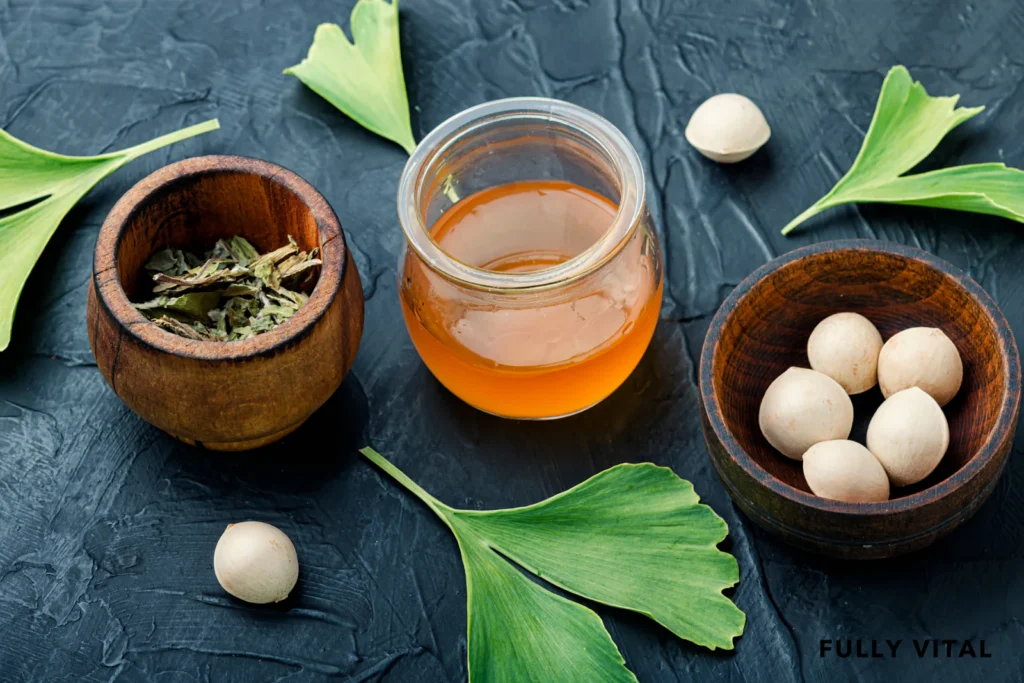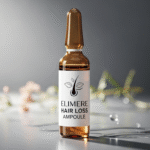Summary: Ginkgo Biloba for Hair Loss, a natural herb known for improving circulation and reducing oxidative stress, shows promise in promoting hair regrowth. By enhancing blood flow to the scalp, it nourishes hair follicles, leading to healthier, thicker hair. While scientific studies support its benefits, ginkgo is best used alongside other treatments, with professional guidance …
Summary:
Ginkgo Biloba for Hair Loss, a natural herb known for improving circulation and reducing oxidative stress, shows promise in promoting hair regrowth. By enhancing blood flow to the scalp, it nourishes hair follicles, leading to healthier, thicker hair. While scientific studies support its benefits, ginkgo is best used alongside other treatments, with professional guidance for optimal results. Always consult a healthcare provider before starting any new supplement.

Table of Contents
Hair loss is a common concern for many, and if you’re searching for natural remedies, ginkgo biloba might be the solution you need. This powerful herb has been used for centuries for various health benefits, and emerging research suggests it could help with hair regrowth.
In this article, we’ll explore how ginkgo works for hair loss, backed by scientific evidence and real-life experiences. Plus, we’ll guide you on how to incorporate it into your hair care routine effectively.
What Is Ginkgo Biloba?
Ginkgo biloba, often referred to as the “memory tree,” is a plant known for its powerful antioxidants and ability to improve circulation. Native to China, ginkgo has been used in traditional medicine for centuries to support brain function, heart health, and circulation. But more recently, it’s been gaining attention for its potential to promote hair growth by improving scalp circulation and reducing inflammation.
This herb contains flavonoids and terpenoids, which are believed to help stimulate the hair follicles by increasing blood flow to the scalp. The more oxygen and nutrients your hair follicles receive, the better they can function, leading to healthier hair growth.
How Ginkgo Biloba Supports Hair Health
Ginkgo biloba’s benefits for hair health are primarily tied to its ability to improve circulation and fight oxidative stress. Here’s how it works:
1. Improves Scalp Circulation
One of the key ways ginkgo biloba aids in hair regrowth is by improving blood flow to the scalp. This increased circulation ensures that hair follicles receive the necessary nutrients and oxygen, vital for their growth and overall health.
2. Reduces Oxidative Stress
Oxidative stress is caused by free radicals, which damage cells, including hair follicles. Ginkgo biloba is rich in antioxidants, which help neutralize these free radicals and protect hair follicles from damage. This reduction in oxidative stress may slow down hair loss and encourage regrowth.
3. Enhances Nutrient Delivery to Hair Follicles
As ginkgo increases circulation, it ensures that the hair follicles get the nutrients they need to thrive. Healthy follicles lead to thicker, stronger hair, reducing the likelihood of breakage or thinning.
Scientific Evidence and Studies

Several studies have looked into the effectiveness of ginkgo biloba for hair loss. One key study published in the Journal of Cosmetic Dermatology found that ginkgo biloba improved hair growth in individuals with androgenetic alopecia (a common form of hair loss). The study showed that participants who used ginkgo biloba reported better hair density and reduced shedding.
Another study published in Phytotherapy Research concluded that ginkgo’s ability to improve circulation could benefit people suffering from hair thinning by delivering more oxygen and nutrients to the scalp.
However, it’s important to note that while ginkgo shows promise, it should be seen as a complementary treatment rather than a cure-all. Consulting with a healthcare provider is always recommended before starting any new supplement regimen.
How to Use Ginkgo Biloba for Hair Loss
If you’re interested in using ginkgo biloba for hair loss, there are a few different options to consider:
1. Supplements
Ginkgo biloba is most commonly available in supplement form, either as capsules, tablets, or liquid extracts. The typical recommended dosage for hair health ranges from 120 mg to 240 mg per day, divided into two or three doses. Always follow the instructions on the product label, and consult with a healthcare provider for personalized advice.
2. Topical Applications
Some shampoos and hair tonics contain ginkgo biloba extract, which can be applied directly to the scalp. These products claim to stimulate the scalp and improve circulation, helping with hair regrowth. While topical treatments may be convenient, they often work best when used in combination with internal supplementation.
3. Ginkgo Tea
If you prefer a more natural route, you can brew ginkgo biloba tea. While this might not be as potent as supplements or topical treatments, drinking the tea can still offer benefits for overall circulation and general well-being, which can indirectly support hair health.
Potential Side Effects and Considerations
While ginkgo biloba is generally considered safe for most people, there are a few things to keep in mind:
1. Possible Side Effects
Some people may experience mild side effects, such as headache, dizziness, upset stomach, or allergic reactions. If you experience any of these symptoms, it’s best to stop taking the supplement and consult with a doctor.
2. Interactions with Medications
Ginkgo may interact with certain medications, particularly blood thinners (e.g., warfarin) and medications for high blood pressure. If you’re taking any medications, it’s important to talk to your healthcare provider before using ginkgo biloba.
3. Precautions for Specific Populations
Pregnant or breastfeeding women should avoid ginkgo biloba unless cleared by a healthcare provider. Additionally, people with bleeding disorders or those who are preparing for surgery should exercise caution due to its blood-thinning effects.
Combining Ginkgo Biloba with Other Hair Loss Treatments
Ginkgo biloba can be a valuable part of a broader hair care regimen. Many people use ginkgo alongside other treatments for hair loss, such as:
- Minoxidil: A common over-the-counter solution for hair regrowth, which can work well when paired with ginkgo biloba’s circulation-boosting effects.
- Finasteride: A prescription medication that can prevent hair loss and, when combined with ginkgo, may provide enhanced results.
- Natural Oils: Essential oils like rosemary, peppermint, and castor oil are known for their hair growth-promoting properties and can complement ginkgo’s benefits.
It’s important to maintain a balanced approach and consult with a dermatologist or hair restoration specialist for guidance on the best combination of treatments for your hair type and needs.
User Testimonials and Real-Life Experiences
Many individuals have shared positive experiences with ginkgo biloba for hair loss. For example, Sarah from New York saw a noticeable improvement in her hair thickness after using a ginkgo biloba supplement combined with minoxidil for six months. She reported less shedding and a fuller, healthier-looking scalp.
Another case study from a patient who struggled with thinning hair due to stress found that after incorporating ginkgo biloba into their daily routine, they noticed less hair fall and an increase in new hair growth within three months.
While these results are promising, individual experiences may vary. It’s important to set realistic expectations and allow time for the treatment to take effect.
FAQs
1. How does ginkgo biloba help hair loss?
It boosts scalp circulation and delivers more nutrients to hair follicles, which may encourage growth.
2. Can I combine ginkgo with other treatments?
Yes, it’s often used alongside minoxidil, finasteride, or natural oils for better results.
3. How should I take ginkgo biloba?
Most people use supplements (120–240 mg daily) or topical products like shampoos or tonics.
4. Are there any side effects?
Mild side effects like headache or dizziness may occur. It can also interact with blood thinners.
5. How long before I see results?
Usually 3–6 months of consistent use is needed before noticing visible changes.
6. Does ginkgo work for all hair loss types?
It may help with pattern baldness, stress-related thinning, and general shedding, but results vary.
Conclusion
Ginkgo biloba is a powerful herb with potential benefits for individuals experiencing hair loss. By improving circulation, reducing oxidative stress, and enhancing nutrient delivery to hair follicles, ginkgo can support healthy hair growth. Whether you choose to take it as a supplement, use a topical treatment, or incorporate it into your daily routine, ginkgo could be a valuable addition to your hair care plan.
However, as with any treatment, it’s essential to consult with a healthcare provider before starting ginkgo, especially if you’re taking medications or have specific health concerns. Combining ginkgo with other proven hair loss treatments can enhance its effectiveness, but always remember to be patient and consistent.
Ready To Take Your Next Step
Are you ready to take control of your hair health? Book a consultation with Dr. Uzma Irfan, an ISHRS-certified surgeon in Islamabad today in Islamabad today to learn how ginkgo biloba and other hair loss solutions can work together to restore your hair’s natural beauty and strength.






